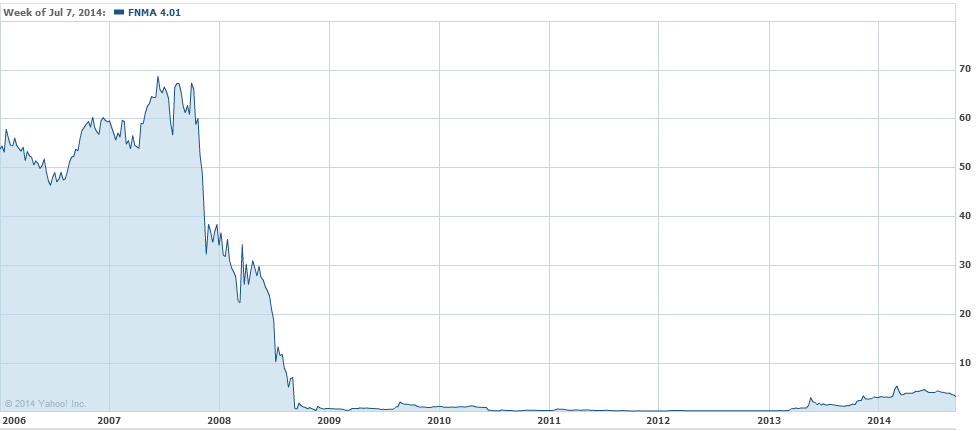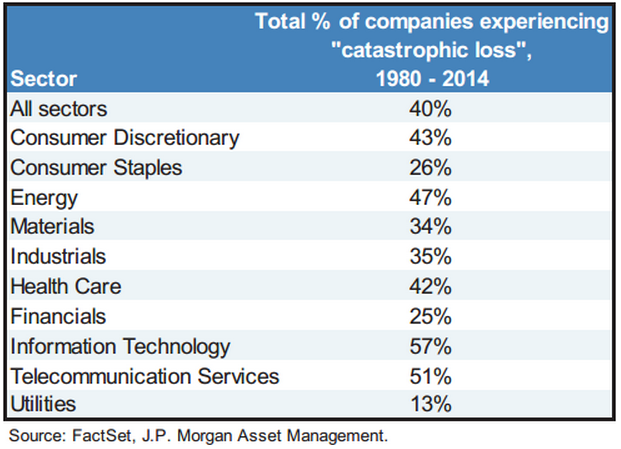“If every stock you own is on the new high list, you’re a momentum guy. If every stock you own is on the new low list, you’re out of business.” – Leon Cooperman
Mean reversion is one of the most powerful forces in all of finance. Above average performance is eventually followed by below average performance. Good times can lead to bad times and the best time to invest is during the bad times.
But this concept is generally reserved for the broader markets, not individual stocks. The problem with ‘buy when there’s blood in the streets’ is that sometimes individual stocks don’t come back from the dead.
Although the market was spitting out tons of value during the financial crisis, not everything available at fire-sale prices worked out. I remember a portfolio manager friend of mine told me he was buying American International Group (AIG) hand over fist when it hit a few bucks a share. “All it has to do is come back half way to the prior peak and I’ll be rich.”
You can see this strategy didn’t work out that well:
 The same thing happened to a number of well-know financial stocks, including Bank of America (BAC):
The same thing happened to a number of well-know financial stocks, including Bank of America (BAC):
Citigroup (C):

And Fannie Mae (FNMA):

One of the most common behavioral biases when buying individual stocks is anchoring to previous levels or the purchase price of a stock. The first thing investors do when researching a stock is pull up a historical chart of past prices. The fact that a company traded for a certain price in the past gives investors a false sense of hope that it will automatically go back to that previous price point. Sometimes this works, but trying to catch a falling knife can be a dangerous strategy if you don’t know what you’re doing.
My friend Michael Batnick shared some great statistics on individual stocks a couple of weeks ago that puts this into perspective from the standpoint of the overall market:
Using a universe of Russell 3000 companies since 1980, roughly 40% of all stocks have suffered a permanent 70%+ decline from their peak value. Looking at the table below, we see that nearly sixty percent of Tech companies have had a catastrophic loss, which they define as “a 70% decline from peak value with minimal recovery.”
Averaging down in a losing stock sounds like a great strategy in theory. And it is, assuming you have a good idea about the future prospects of the business in question and are fairly certain the market is undervaluing the company. Stating the obvious, this is not an easy task.
Be fearful when others are greedy but make sure you understand what you’re buying into.
Source:
The risk of concentrated portfolios (Irrelevant Investor)

[…] Stocks Do Not Come Back […]
Some scary charts there – and a reasonable warning that if you choose to pick individual stocks you should at least pause for a second before deciding to automatically reinvest dividends and/or DCA. That’s more of an indexing game.
Although, if your friend did call the bottom on some of those stocks, he at least made some money back… of course, at greater risk than just buying SPY.
Right, from a very low base some of these could actually have been a good buy for a quick trade. Unfortunately, I think most people mistimed it by getting in too early and out too early to get those big bounces.
[…] Why averaging down doesn’t make sense. (A Wealth of Common Sense) […]
[…] research confirms that those are the very stocks that are most likely to do well in the future). Ben Carlson recently weighed in on this […]
[…] https://awealthofcommonsense.com/stocks-dont-come-back/ […]
[…] Some stocks don’t ever come back – A Wealth of Common Sense […]
[…] Some shares don’t ever come again – A Wealth of Common Sense […]
[…] At new to me A Wealth of Common Sense, a nice piece on individual stocks which dropped heavily… and never made a comeback to their prior prices. […]
[…] cannot buy stocks just because they have declined. Some of them never come back! Ben Carlson has charts, data, and analysis. Here is his summary of stocks that had a catastrophic loss – a […]
[…] Some Stocks Don’t Come Back The Risk of Concentrated Portfolios […]
[…] Most of the time we hear that the stock market is the best asset for the long term. But we have to count with one thing. Not too many companies make it to the top. Most of the companies never grow. We mostly speak about S&P 500, but not about stocks, which were removed from the index or never made it to the index. And there is lot of stocks like that. Here I quote Michael Batnick from JP Morgan (via A Wealth Of Common Sense) […]
You’re describing the majority of FAIRX’s holdings.
I suppose it all depends on the prices that Berkowitz paid for these stocks. Could still be decent investments at the right price. You never know.
[…] https://awealthofcommonsense.com/stocks-dont-come-back/ […]
[…] Reading: Some Stocks Don’t Come Back A Lesson in Market […]